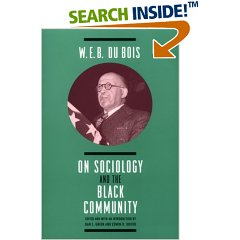John
Brown

This new edition of Du Bois's John Brown includes the
text of the original 1909 edition and is accompanied by
a major introduction that underscores Du Bois's
intellectual and emotional debt to the martyred
abolitionist. John David Smith's introduction asks new
questions about Brown's influence on Du Bois's emerging
thoughts on race and society. Smith also provides
contextualizing documents, including letters from Brown
to his family and Frederick Douglass's account of his
last meeting with Brown.
As John David Smith makes clear in his helpful
introduction, this emotional biography, while insightful
regarding Brown, is just as valuable for what it reveals
about Du Bois's own evolving ideology, particularly his
thoughts about race, class, and imperialism around the
time of the founding of the NAACP. Teachers of African
American history and pre-Civil War U.S. history might
well want to consider exposing their students to this
provocative publication—one certain to provoke
considerable debate and thought among their students.
— (Robert E. May, Purdue University)
Du Bois' John Brown is a classic of American biography.
It is good to have it available for students and
scholars, once again.
— (Eric Foner, Columbia University)
Autobiography of W. E. B. Dubois: A Soliloquy on Viewing My
Life from the Last Decade of Its First Century

The Souls of Black Folks

From AudioFile:
Du Bois's classic, first published in 1903, is read with
sensitivity and insight by Warren Hazlett. As the author
writes of the condition of blacks in the United States, the
influence of leaders such as Booker T. Washington, and the
meanings of black music, which he calls "sorrow songs," the
listener will be struck by how many of his observations
still resonate in the new millennium. Hazlett narrates with
strength and nuance, and the immediacy of his style brings
the book to life. His phrasing and intonations are always
appropriate to the text, expressing the shade of emotion
needed. Those who might find the text difficult to stay
with--or who might never have attempted to read the
book--should be drawn along with the narrative, thanks to
Hazlett's skill. M.A.M. © AudioFile 2005, Portland, Maine--
Copyright © AudioFile, Portland, Maine
W. E. B. DuBois on Sociology and the
Black Community

Book Description:
Historian, journalist, educator, and civil rights
advocate W. E. B. Du Bois was perhaps most accomplished
as a sociologist of race relations and of the black
community in the United States. This volume collects his
most important sociological writings from 1898 to 1910.
The eighteen selections include five on Du Bois's
conception of sociology and sociological research,
especially as a tool in the struggle for racial justice;
excerpts from studies of black communities in the South
and the North, including
The Philadelphia Negro;
writings on black culture and social life, with a
selection from
The Negro American Family; and
later works on race relations in the United States and
elsewhere after World War II. This section includes a
powerful fiftieth-anniversary reassessment of his
classic 1901 article in the
Atlantic in which he
predicted that "the problem of the twentieth century is
the problem of the color line."
W. E. B. Du Bois, Race, and the
City:
The Philadelphia Negro and its Legacy
